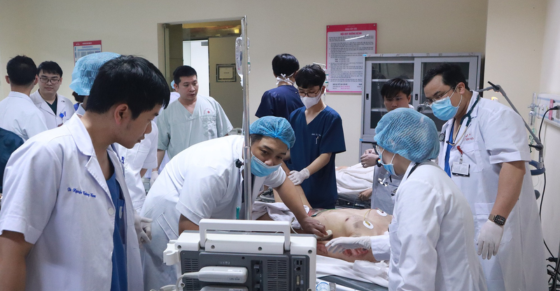Newest regulations on licensing conditions for out-of-hospital emergency care facilities in Vietnam
The content of the following article presents the newest regulations on licensing conditions for out-of-hospital emergency care facilities in Vietnam

Newest regulations on licensing conditions for out-of-hospital emergency care facilities in Vietnam (Image from the Internet)
1. General licensing conditions for out-of-hospital emergency care facilities in Vietnam
- Scale: Must have a scale appropriate to the form of organization of the medical examination and treatment establishment in Vietnam.
- Facilities:
+ Must have a fixed location complying with legal regulations on: structural safety, fire prevention and firefighting, infection control, environmental protection, radiation safety (if applicable); ensure sufficient electricity and water for the operation of the medical examination and treatment establishment;
+ Must possess signage, maps, and directional signs to departments, rooms, and specialized, administrative sections;
+ If there are additional facilities not within the premises of the medical examination and treatment establishment, they must meet the specific conditions for each form of organization of the establishment as stipulated in Article 39 of Decree 96/2023/ND-CP.
- Must have medical equipment suitable with the list of specialized techniques and the registered scope of operations.
- Personnel:
+ Must have sufficient practitioners according to the scale, technical list, and achieve a ratio of practitioners as prescribed by the Minister of Health (including those already licensed by the People's Armed Forces who are licensed but no longer working in the Armed Forces and continue to use the issued practice license);
+ The person responsible for technical expertise must be a full-time practitioner of the establishment and have a scope of practice appropriate to the establishment's specialized scope, with a minimum practice time in that scope of 36 months unless the practitioner has the title of a traditional medicine physician, has a family medicinal formula or method;
In cases where the establishment includes multiple specialties, the practice license of the person responsible for technical expertise must align with one of the specialties registered for operation;
+ The person in charge of the specialized department or unit must have a practice license appropriate to that specialty and must be full-time at the establishment;
+ Practitioners must be assigned work within the scope of practice approved by the competent authority;
+ Medical techniques in the scope of laboratory medicine at a university level must read and sign the test results. If the establishment lacks practitioners with a practice license in the roles of medical laboratory specialist or medical technician at a university level, the ordering doctor reads and signs the test results;
+ Medical imaging techniques within the scope of practice at a university level must be able to read and describe diagnostic images. If the establishment lacks practitioners with a practice license in roles like specialist doctors or medical imaging technicians at a university level, the ordering doctor reads and signs the diagnostic images;
+ Other individuals involved in the process of medical examination and treatment but do not require a practice license as prescribed at Point D, Clause 2, Article 19 of the Health Examination and Treatment Law 2023 (medical physicists, radiotherapy engineers, biotechnology engineers, and applied biotechnology bachelors and other individuals, hereinafter referred to as workers) are permitted to conduct professional activities assigned by the technical expert of the medical examination and treatment establishment, with the assignment matching the individual's qualifications and capabilities;
+ When a practitioner is concurrently a lecturer at a health training institution and also works at a medical examination and treatment establishment that is a training practice facility, they are permitted to concurrently hold leadership positions in the departments and specialized divisions of the medical examination and treatment establishment.
- Establishments organizing health examinations must not only be organized in the form of a hospital or polyclinic but must also meet the following additional conditions:
+ Must have enough departments for clinical, paraclinical examinations, personnel, and necessary medical equipment to examine and detect health conditions according to health standards and the health examination form issued with guidance documents;
+ Ensure interconnection of health certificate data with the Health Examination and Treatment Management Information System or the national health database or the Insurance Health Information Examination Data Reception Gate.
- Establishments organizing HIV/AIDS examination and treatment activities must be organized in the form of a hospital or clinic and also satisfy the following conditions:
+ Facilities: Minimum area of 18m² (excluding waiting area), divided into two rooms to perform examination and provide counseling to patients;
+ Personnel: The person responsible for the technical expertise of the HIV/AIDS clinic and treatment must be a licensed physician with certification of training in HIV/AIDS examination and treatment issued by a legitimate training institution;
+ Must have an emergency allergy prevention kit and sufficient specialized emergency medicines suitable for the specialties within the clinic’s operational scope.
- Establishments performing occupational disease examination and treatment besides being organized in the form of a hospital, polyclinic, inter-specialty clinic, specialty clinic, or doctor's clinic must satisfy the following conditions:
+ Ability to perform biochemical testing techniques suitable with occupational disease diagnostic guidelines intended for implementation;
+ Must have medical equipment matching the list of specialized techniques and the occupational diseases registered for medical examination and treatment;
+ Persons performing occupational disease examination and treatment must have a medical license with the title of a physician with a scope of practice in preventive medicine training or a specialist doctor with a certificate in occupational disease.
+ If organized as an independent establishment solely for occupational disease examination and treatment, the person responsible for technical expertise must meet the following conditions:
++ Be a licensed specialist doctor in occupational diseases or a licensed doctor with a specialized practice license and certified occupational disease training or a licensed doctor with a general medical practice license and occupational disease training certification;
++ Must have a minimum of 36 months of practice post-certification or practice licensure in examination and treatment.
- Establishments organizing HIV examination services must be organized in the form of a hospital, polyclinic, inter-specialty clinic, specialty clinic, doctor’s clinic, or paraclinical service establishment and comply with the conditions outlined in Decree 75/2016/ND-CP about conditions for implementing testing services for HIV.
- Establishments performing assisted reproductive technologies and surrogate motherhood for humanitarian reasons must be organized in a hospital form and comply with additional conditions as specified in Decree 10/2015/ND-CP regarding assisted reproductive technologies and humanitarian surrogacy conditions.
- Establishments specified in clauses 1, 2, 3, 4, and 7 of Article 39 Decree 96/2023/ND-CP are entitled to provide examination, consultancy, and preventive treatment services.
- Establishments that have been licensed to operate under any forms specified in Article 39 Decree 96/2023/ND-CP can supply services of other organizational types or provide health examination, medical examination, and treatment for HIV/AIDS or occupational diseases if the condition for that form is adequate.
If conditions for other organizational forms or services for health examination, HIV/AIDS examination, and treatment are met at the time of application for a new operating license, a proposal for the evaluation for that service may also be submitted along with the application.
If conditions are met post issuance of the operating license, procedures for adjusting the operating license must be followed. However, for health examination, HIV/AIDS examination, and treatment services, license adjustments are unnecessary but a public announcement per Article 69 Decree 96/2023/ND-CP is mandatory.
If providing services for medical examination and treatment aligns with family medicine principles, a practitioner with the title of a doctor must meet one of the following conditions:
+ Have a specialist license in family medicine;
+ Hold a certificate of training, fostering at least 3 months in family medicine;
+ Have a certificate covering from single courses or credits with contents in family medicine training programs or courses with a total time of at least 3 months.
- Establishments providing cosmetic services listed below or using products with pharmacological effects must be organized in one of the forms such as hospitals or polyclinics or specialty clinics:
+ Cosmetic services using medications, substances, equipment interventions on the human body (surgery, interventions with injection, injection, illumination, waves, burning, or other invasive interventions) to:
++ Change skin color, shape, increase weight, reduce weight (slimming, body fat reduction);
++ Fix defects or form as desired on body parts (skin, nose, eyes, lips, face, chest, abdomen, buttocks, and other body parts);++ Restore, regenerate cells or parts or body functions.
+ Tattooing, spraying, embroidering services on skin using injectable anesthetics.
- In the case of humanitarian medical examination, treatment establishments or non-profit medical examination, treatment establishments, besides meeting conditions in clauses 1 through 12 of Article 40 Decree 96/2023/ND-CP, must meet the following additional conditions:
+ Other specific conditions corresponding to the form of the humanitarian medical examination, treatment establishments;
+ Have financial resources for operating humanitarian medical examination and treatment;
+ The sign of the medical examination and treatment establishment must clearly state that it is a humanitarian medical examination and treatment establishment or a non-profit medical examination and treatment establishment.
(According to Article 40 Decree 96/2023/ND-CP)
2. Newest reguations on licensing conditions for out-of-hospital emergency care facilities in Vietnam
According to Article 56 Decree 96/2023/ND-CP, in addition to meeting the general conditions specified in Section I, out-of-hospital emergency care facilities must satisfy the following conditions:
* Facilities:
- Must have an area for disinfecting ambulances with complete disinfection tools and means or have a disinfection contract with a licensed healthcare facility meeting the Ministry of Health’s disinfection requirements.
- Must have a duty room, staff on-duty, telephone switchboard duty located at the headquarters 24/24 hours every day for out-of-hospital emergency care facilities.
- The headquarters do not include the area for parking emergency transport vehicles.
- Emergency transport vehicles:
+ Must have at least 02 ambulances for out-of-hospital emergency care facilities;
+ The ambulances must meet the current standard regulations.
- Must have emergency anti-panic kits and ensure enough drugs and hygiene conditions for patient safety.
* Personnel:
The person responsible for technical expertise at out-of-hospital emergency care facilities must be a practitioner with one of the following titles:
- Physician;
- Outpatient Emergency Medical Technician.
- Cases of land rent exemption and reduction under the latest regulations in Vietnam
- Economic infrastructure and social infrastructure system in Thu Duc City, Ho Chi Minh City
- Regulations on ordination with foreign elements in religious organizations in Vietnam
- Increase land compensation prices in Vietnam from January 1, 2026
- Determination of land compensation levels for damage during land requisition process in Vietnam
- Who is permitted to purchase social housing according to latest regulations in Vietnam?
-

- Number of deputy directors of departments in Vietnam ...
- 15:04, 05/03/2025
-

- Cases ineligible for pardon in Vietnam in 2025
- 14:43, 05/03/2025
-

- Decree 50/2025 amending Decree 151/2017 on the ...
- 12:00, 05/03/2025
-

- Circular 07/2025 amending Circular 02/2022 on ...
- 11:30, 05/03/2025
-

- Adjustment to the organizational structure of ...
- 10:34, 05/03/2025
-

- Notable new policies of Vietnam effective as of ...
- 16:26, 11/04/2025
-
.Medium.png)
- Notable documents of Vietnam in the previous week ...
- 16:21, 11/04/2025
-
.Medium.png)
- Notable documents of Vietnam in the previous week ...
- 16:11, 02/04/2025
-
.Medium.png)
- Notable new policies of Vietnam to be effective ...
- 16:04, 02/04/2025
-
.Medium.png)
- Notable new policies of Vietnam effective from ...
- 14:51, 21/03/2025

 Article table of contents
Article table of contents
